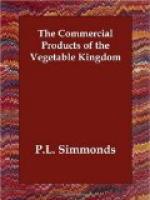become tough and capable of being formed into masses.
This process is peculiar to Malwa. It is now
made up into balls of from eight to ten ounces
each, these being thrown, as formed, into a basket
full of the chaff of the seeds pod. It is next
spread out on ground previously covered with leaves
and stalks of the poppy; here it remains for a
week or so, when it is turned over and left further
to consolidate, until hard enough to bear packing.
It is ready for weighing in October or November,
and is then sent to market. It is next packed
in chests of 150 cakes, the total cost of the drug
at the place of production being about fourteen
rupees per chest, including all expenses.
About 20,000 chests are annually sent from Malwa,
at a prime cost charge of two lacs and 80,000 rupees.
It may easily be supposed that manipulations so
numerous, complex, and tedious, as those described,
give the most ample opportunities for the adulteration
to which the nature of the drug tempts the fraudulent
dealer.
In order to enable the cultivator to carry on his agricultural operations, he receives from time to time certain advances, the amount of which reaches in the aggregate to about one-half of the value of the estimated out-turn of produce. If the land has been under cultivation in previous seasons, its average produce is known; if it be new land, and considered by the Sub-Deputy Agent as eligible, then the cultivator, in addition to the usual advances, receives an advance of so much per biggah to enable him to bestow a certain amount of extra care in tilling and dressing the soil. The first advance is made on the completion of the agreement or bundobust, and this takes place in September and October. The second advance is made on the completion of the sowings in November, and the final or Chook payment is made immediately after the delivery and weighing of the produce. Nothing therefore can be fairer to the cultivator than this system of advances; he is subject to no sort of exaction, in the shape of interest or commission on the money which he receives, and it puts within his power the certain means of making a fair profit by the exercise of common care and honesty. It is an established rule in the Agency that the cultivator’s accounts of one season shall be definitively settled before the commencement of the next, and that no outstanding balances shall remain over. When a cultivator has from fraud neglected to bring produce to cover his advances, the balances due by him are at once recovered, if necessary by legal means; whereas, if he can satisfactorily show that he has become a defaulter from calamity and uncontrollable circumstances, and that the liquidation of his debt is placed entirely beyond his power, his case is then made the subject of report to the Government by the Agent, with the request that the debt may be written off to profit and loss. These provisions are most wise, for outstanding balances may be made the means of oppression,




